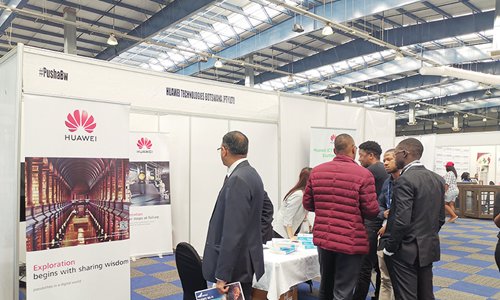HOME >> BUSINESS
In Botswana: China’s pragmatism wins over US idealism
By Wang Cong in Kasane Source:Global Times Published: 2019/8/12 20:09:47
Botswana’s dramatic shift in attitude toward Beijing a latest example

Visitors check out the Huawei vendor at the 2018 Global Expo in the capital of Gaborone on August 6. Photo: Wang Cong/GT
In the summer of 2014, former US president Barack Obama, facing criticism that the first African-American president was ignoring Africa and US' influence in the continent was squeezed by other countries, particularly China, convened the first US-Africa Leaders' Summit.
He had a clear message for 50 African heads of state: The US has a better model for African development and African nations should ensure that Chinese-built "roads don't just lead from the mine, to the port, to Shanghai."
Since that meeting, much has changed. Obama has been replaced by a completely different president, Donald Trump, who has stirred controversy over comments that some argue border on racism, telling US lawmakers of color "to go back to their countries" and describing African and other countries as "shitholes."
Still, much has remained the same. The US continues to fail to understand the real needs of African nations in their pursuit of economic development and continues to smear Chinese investments in the continent with dramatic yet unsubstantiated claims such as "debt trap diplomacy" and "neo-colonialism."
But one undeniable truth emerges that China's pragmatic approach toward Africa - marked by win-win cooperation with no political strings attached - is gaining popularity. The US model - less realistic cooperation but full of political pre-conditions and idealism - has been cast aside.
This reality is on vivid display in Botswana, a small southern African nation known for its massive reserves of diamonds and magnificent natural attractions. From the presidential office to conference halls in the capital of Gaborone to the leafy streets of the northern tourist town of Kasane, one voice stands out: Botswana wants more Chinese businesses in a wide range of areas from infrastructure to manufacturing to tourism.
Since taking office in April 2018, President Mokgweetsi Masisi has overturned the hostile approach toward China adopted by his predecessor Ian Khama and moved to repair diplomatic woes and strengthen economic and trade ties with China. He became the first Botswana president to pay a state visit to China within four months of assuming office and attended the Forum on China-Africa Cooperation.
Speaking at the opening of the Global Expo Botswana (GEB) - an initiative to raise the country's global profile - last week, Masisi argued that emerging markets like China are "disrupting global poles of power and commercial activity" and that Botswana needs to adapt to this global "reorientation of power, culture and ways of doing business."
At the GEB, there was only one Chinese company - Huawei Technologies. But the interest in bringing in more Chinese companies was palpable. Keletsositse Olebile, CEO Botswana Investment and Trade Center, the organizer of the expo, said that 200 Chinese companies had been expected but did not attend. The companies did not show up because of limited time for preparation as the expo were moved up from its usual time in October to April due to a planned general election, which Masisi is widely expected to win.
At the GEB, some local businesses in areas such as online game development and marketing approached me, apparently mistaking me for a Chinese business representative, to discuss their companies. "There are many great Chinese video game companies. Hopefully one day I can go visit," a young video game developer told me.
A tour bus driver in Gaborone asked for help from the reporter to get a job at a local private hospital invested in by a Chinese businessman. "You talked to the boss [about] me?" he asked me several times after driving me to an interview with the Chinese businessman, Ye Xiaoyang. "I hear Chinese bosses are good."
In Kasane's China Town, a residential area built by Chinese workers, a taxi driver told me that this is a very nice area built by Chinese people long time ago. "I don't know why they don't build more here," he said, when asked if Chinese companies are building more houses in the city. At the Cresta Lodge Hotel in Kasane, where most guests are from Europe, Japan and Singapore, one employee asked me "Why don't they come here?" referring to Chinese tourists.
While some Western officials and media outlets try to tell the world that there is too much Chinese presence in Africa, officials and people from all walks of life who I encountered said they want more Chinese business.
China should heed these calls to further step up cooperation with Africa and not let noise derail a mutually beneficial path forward.
Newspaper headline: China’s pragmatism wins over US idealism